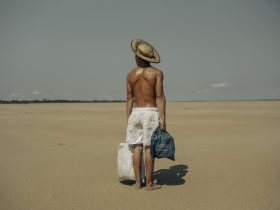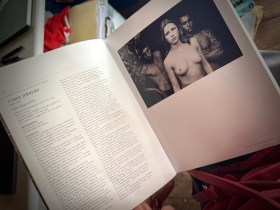The Head On Foundation recently delivered an online workshop offering tips to impress judges at photography competitions and the session included suggestions ranging from what to look for in a prize to reasons to enter. The Foundation delivers an international festival and annual photography awards staged Australia.
In this article, ArtsHub summarises seven key takeaways from Head On Founder and Creative Director, Moshe Rosenzveig OAM on how to stand out in photo contests and maximise your chance of winning a prize.
In this article:
Respond to competition theme and style
Photo competitions usually have multiple categories themed by the subject of the photograph, such as portrait, landscape etc. Make sure you are responding to that theme.
However, some competitions and judges may accept a wider definition than others. For Head On, judges have previously accepted a photograph entered into the Portrait category without any people in view. Jasmin Poole’s Goodbye Grandpa presents an empty bed where her grandfather spent the last moments of his life.
Rosenzveig says, ‘What we are looking for is the essence of a person out of that picture.’
Looking at past exhibitions will give entrants a good idea of what is accepted.
Showcase your vision
Just like any other field, trends come and go in photography, but what’s more important is your individual vision. Don’t try to latch onto what’s hot and, instead, think about what makes you different and unique.
Tell stories
This can be done not only with the photograph itself, but through the clever use of titles, just like Poole’s image.
However, balance is important. Storytelling is not about giving everything away, but just enough so the viewer can conjure the rest of that story in their minds.
Read: 5 tips to maximise your chances of being a guest at writers’ festivals
Be bold
Rosenzveig advises that photo competitions are a perfect opportunity to be bold and ‘do some crazy things’ like using double exposure or recreating realities.
’Whatever it is, just go for it; don’t do the usual stuff,’ he says.
Being bold is what will help your image of a mountain or a river stand out against the countless others.
Don’t use clichés
Adding to the advice to be bold, Rosenzveig is strongly against the use of clichés such as submitting a photo of a common landmark without any sort of creative reimagining.
Clichéd photos are the kinds you’ll find in stock images – standard, but not spectacular and certainly with a very low chance of catching the judges’ attention in a competition.
Don’t just strive for technical perfection
For Rosenzveig, technical perfection, such as sharpness and exposure, is less important than the atmosphere of an image. He explains, ‘It’s about catching the moment and the feeling of what it was like. The pictures should be of good quality, but they don’t have to be absolutely perfect.’
Use a good title and caption
It’s OK to use Untitled for a photograph, but if you decide to title your work, it should seek to expand on the imagery, rather than offer an explanation.
Captions can offer more context around the subject or situation when the photograph was taken, but ‘remember judges don’t have much time to read,’ says Rosenzveig. ‘Don’t describe what’s in the picture, but write something that complements it.’
Even when you’re put against a panel of expert judges, avoiding art jargon and overcomplicating an idea will make life easier for everyone.
The full recording of the Head On’s ‘Tips for photo contests’ online workshop is available on its website.
Entries for Head On Photo Awards 2024 are now open and close 18 August. It is an international call out for entries.


_Encounters-in-Reflection_Gallery3BPhoto-by-Anpis-Wang-e1745414770771.jpg?w=280)


